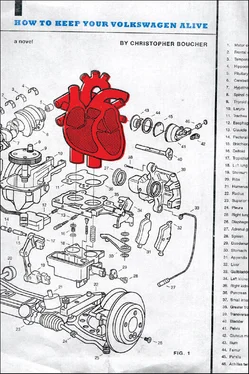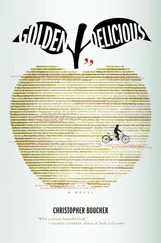The project took two years of flexing to complete. I was a flipper at the time, young and two-minded, and I didn’t help out as much as I should have. As I grew older, though, I became more involved in running the place.
When my father was attacked by a Heart Attack Tree in 2003, I moved into one of the apartments and vowed to do the Memory of My Father proud, to hold that house in my arms and nurse it the way my Dad would have wanted me to. But then my son was born, and there just wasn’t enough time to go around. Every week I was spending four or five hours at least on parts for the car. That might not sound like a lot, but it adds up! New front sensors run anywhere from fifteen to twenty hours a pop, and the custom break system cost me sixty-five hours alone! I probably visited one store or another — ParentParts, Faces, Northampton Custom Auto — at least every other day for something for my son.
At the same time, the house was o’reillying — the sinks moaning, the heaters rumpering, the wires in the walls gnashing their teeth. Winter was coming and I didn’t have a single moment in my pocket. Plus, my Volkswagen was getting older — old enough, now, to drive — and that required time as well; time for tires, time for bulbs, two hours a morning for booking for fuel (maintenance, documentation, narrative, you name it!).
One day, desperate for time, I went down to Faces and sold my name. But the time they gave me for it lasted us a little less than a week.
Then I heard that the Daily Wheel was looking for a reporter, which is another word for a fontana, a person who works with words. So I went to their offices on Conz Street and I sat down with an editor, a small block of cheese named Louise. I showed her my schoolscars and my writing-torn wrists and she read some of my buildings.
After a few minutes of reading she looked up from the page. “And you have a car?”
“A son? Yes,” I said.
“And it’s dependable?” she said.
“When he’s in the mood to be, yes,” I said. I laughed, but Louise stared at me like a wood-burning stove. “Yes,” I said.
The next morning I woke the VW up early and told him that he wouldn’t be going to school that day. Instead we drove down Route 9, onto Conz Street and into the Wheel parking lot. The VW pulled into a space next to a line of cars that were for some reason (they were either sleeping, shy or dead) completely silent.
“What now?” the VW said as he slowed to a stop.
“What?” I said. “I’ve got to go inside.”
“And what am I supposed to do?”
“You stay here,” I said.
“For how long?”
“I don’t know,” I said. “I’ll probably be out in a couple of hours.”
“Oh, come on ,” the VW said. “You want me to just sit here? Why can’t I go back to school?”
“Because I need you for transportation,” I told him, closing the driver’s side door and walking towards the office entrance.
“When do I go back?”
I turned around. “If this job works out, I don’t know that you will go back to school,” I said. Then I pointed at him. “Take notes on everything you see.”
“This sucks ,” the VW said.
I can still remember the offices of the Wheel , the way the place reverberated and turned, the feeling of those words against my lips, still warm from the pressing. I remember, too, how good it felt to be there, out of that howling house and doing something. It was only when I got away from the apartments that I realized how much of a toll it took on me to keep them going. I was living in a structure of loss, and as I breathed in that loss it was changing me. I rarely tasted my food. Sometimes I’d open up a book and all the words would be the same.
But writing for the newspaper turned out to be much harder than I thought, and Louise had her hands full trying to teach me the basics. We spent hours at her desk reviewing articles together, talking about how they were built — where to put the front door and the porch lights and the plumbing.
“See, these things don’t really work like fiction does,” she explained, pointing at the printout with her cheese-arm.
“You mean, like fuel?”
She blinked my question away. “What I’m saying is, everything in here is true.”
“The engine is true, too,” I said, snapping my suspenders. “True as in, literal. ”
“Look,” she said. “See how this story cascades from the top down, with the most important information first?”
“I love that idea, of words
cascading,” I said.
“And check out the lead,” she said, pointing to the first line. “See its teeth?” She read my face, the power that had appeared. “No — lede,” she said. “L-e -d -e.”
My face changed.
“Are you with me?” she asked.
“Absolutely,” I told her.
I learned from Louise that a story is nothing more than a series of events, and also that a reader cares more about a story when they see themselves in it. This was totally new information for me. Was this why the VW was ill all the time — because people couldn’t see themselves in the fuel? Or because more needed to happen?
A few days later I was sent out on my first official story: Somehow Main Street in Northampton had transformed from a street to a canal. Louise called me in the middle of the night and told me to get down there and find out what had happened — how the streets had filled, who was hurt, if anyone had been killed and what would happen now.
I said I’d be right there.
“Sorry if I woke up your wife, by the way,” she said.
The closest thing I had to a partner in those days was a future pile of shattered glass. “No no,” I told her, “I am completely alone.”
She said she’d see me in the morning and we hung up. I thought fast: Canal. Volkswagen.
I picked up the cordless phone, busked down to the basement and called the Memory of My Father. It was four in the morning. I didn’t have a ready memory of talking to my father that late, though, so the voice that answered the phone was the one I heard whenever I called around 11:30, just after my Dad went to bed. If I called that late my Dad would know it was me, and he’d answer the phone without asking who it was. “What’s up,” the Memory of My Father said when he picked up.
“Dad,” I said. “Didn’t we used to have an outboard motor somewhere down here?”
He thought about it for a minute. “Jesus, _____ — I don’t have a clue,” he said. “I can look next time I’m up there.”
“I need it now,” I said.
“You need it right this minute,” he crullered.
“I do — for a story,” I said.
“Cris,” he swore.
“Wasn’t it in the room with the furniture?”
“I moved it,” the Memory of My Father said. “How about under the worktable?”
I took the phone into the dusty, junk-filled workshop and turned on the lights. Bugs scurried in every direction, swearing and muttering insults.
I looked under the table. “I don’t see it,” I said.
“How about the boiler room?”
I went into the boiler room — all five burners were humming in the modal key of heat. I stepped between them. “Where?” I said.
“The only place it could be in there is behind those drop tiles,” the Memory of My Father said.
I pushed a pile of drop ceiling tiles over and saw the motor in the corner, leaning against the brick and covered with a thick layer of pink dust. “Found it,” I said.
“It’s there?”
“I have it right here,” I said.
“Son of a bitch,” the Memory of My Father said. “Talk about a lucky guess.”
“Sorry to wake you,” I said.
“Not a problem,” the Memory of My Father said, just like my father would, and he hung up the phone.
Читать дальше












